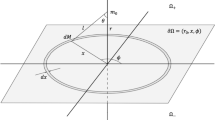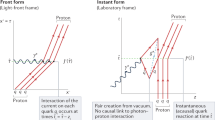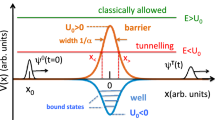Abstract
THE classical theory of a point charge and the quantum theory of wave packets contain in their usual form well-known divergences, Dirac1 has elaborated a classical particle theory which avoids these difficulties, but his results cannot as yet be applied to quantum theory. On the other hand, Heisenberg2 has recently proposed a new formalism which permits the calculation of collision cross-sections in quantum theory without being disturbed by diverging terms. However, no connecting link such as the correspondence principle has been given in order to apply this quantum formalism to a given problem such as Rutherford scattering, Compton effect or radiation damping.
This is a preview of subscription content, access via your institution
Access options
Subscribe to this journal
Receive 51 print issues and online access
$199.00 per year
only $3.90 per issue
Buy this article
- Purchase on Springer Link
- Instant access to full article PDF
Prices may be subject to local taxes which are calculated during checkout
Similar content being viewed by others
References
Dirac, Proc. Roy. Soc., A, 167, 148 (1938).
Heisenberg, Z. Phys., 120, 513 and 673 (1943).
Weisskopf and Wfgner, Z. Phys., 63, 54 (1930).
Author information
Authors and Affiliations
Rights and permissions
About this article
Cite this article
STUECKELBERG, E. An Unambiguous Method of Avoiding Divergence Difficulties in Quantum Theory. Nature 153, 143–144 (1944). https://doi.org/10.1038/153143a0
Issue Date:
DOI: https://doi.org/10.1038/153143a0
Comments
By submitting a comment you agree to abide by our Terms and Community Guidelines. If you find something abusive or that does not comply with our terms or guidelines please flag it as inappropriate.



